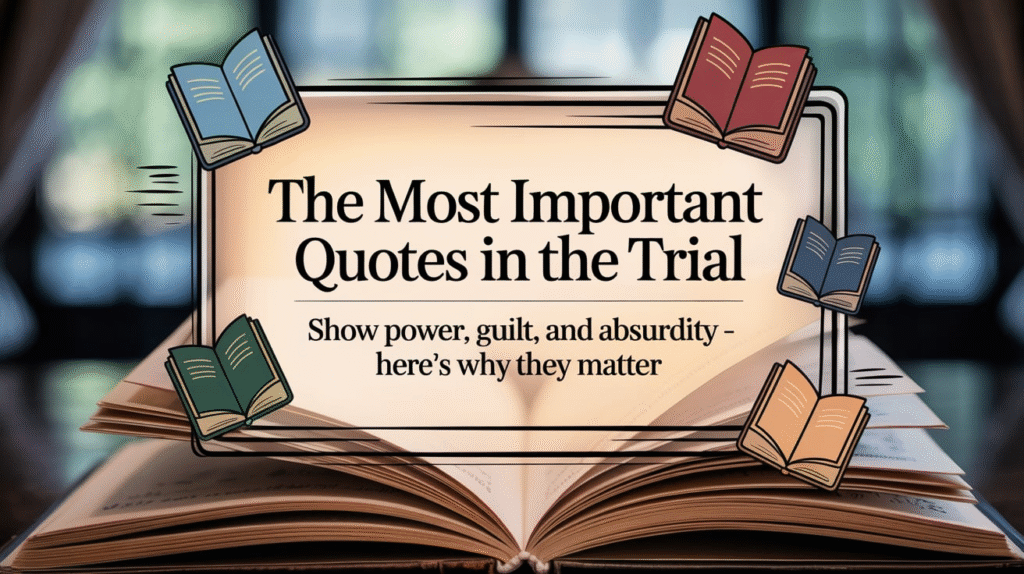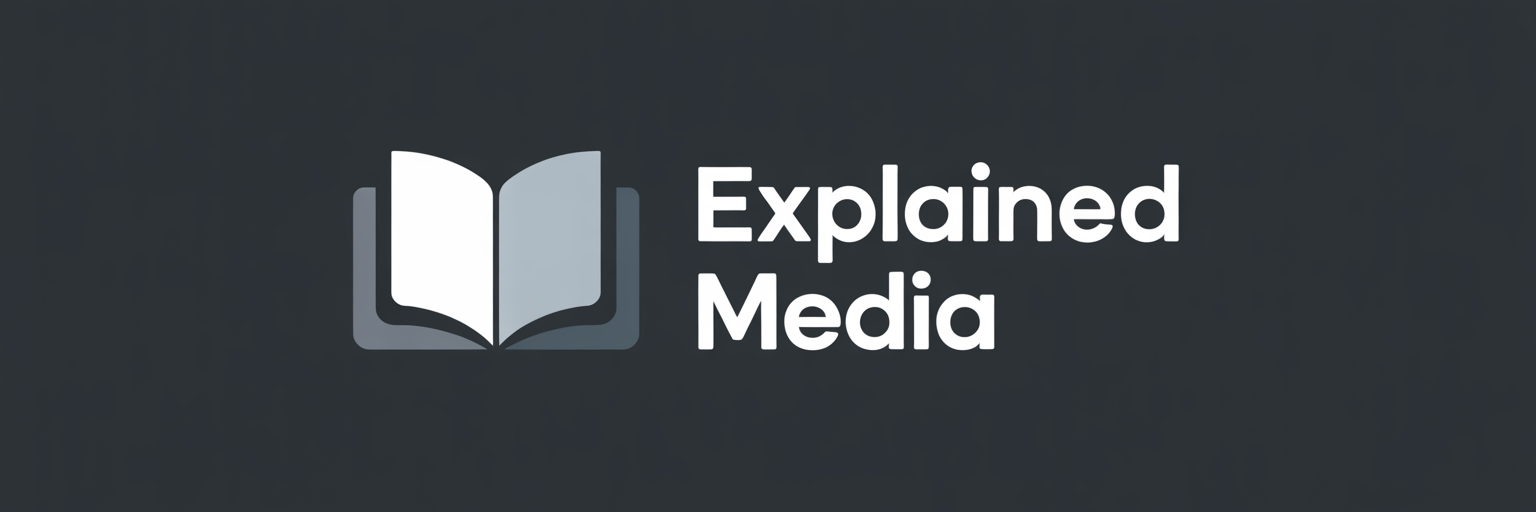The most memorable quotes in Franz Kafka’s The Trial reveal the heart of the novel: the crushing weight of bureaucracy, the experience of guilt without cause, and the paradox of seeking justice from an unknowable system. Each key passage encapsulates the novel’s existential dread and its reflection of modern life. By examining these quotes, we uncover why The Trial continues to resonate across generations.

“Someone must have been telling lies about Josef K., for without having done anything wrong he was arrested one morning.”
This iconic opening line establishes the world of Kafka’s novel and sets the tone for the themes that follow.
Why it matters
The statement is deliberately matter‑of‑fact, but it holds extraordinary weight. Kafka refuses to reveal what K. has done, showing us that guilt can be declared without evidence.
- It announces the theme of arbitrary authority from the very first line.
- It positions the reader in the same state of ignorance as K., immediately implicating us in his disorientation.
Broader implications
The line anticipates a society where truth and lies are interchangeable once a bureaucracy decides what is “official.” It resonates today in contexts where institutions act on suspicion rather than proof.
“It’s only a trial, if you accept it as one.”
This quote, often paraphrased from the officials’ dialogue, crystallises the absurdity of the legal system in the novel.
Why it matters
The statement suggests that power operates partly through consent: the accused’s acknowledgement gives authority its legitimacy.
- Authority depends not only on law but on the accused believing in the court’s right to act.
- Resistance, however, is futile—refusal to recognise the trial does not make it disappear.
Broader implications
The quote exposes a paradox still relevant today: how systems of power compel compliance even when their legitimacy is questionable.
“The proceedings were not a secret, but they were also not something one could openly talk about.”
Kafka demonstrates how secrecy and visibility intertwine in the workings of bureaucracy.
Why it matters
K. exists in a limbo between public accusation and private ignorance. The process is simultaneously open—people whisper and gossip—and opaque, since no one can ever explain its logic.
- Ambiguity itself is a weapon: neither clarity nor full secrecy gives K. any control.
- The court becomes a rumour machine, eroding K.’s reputation without transparency.
Broader implications
This line resonates with contemporary concerns about surveillance, privacy, and institutions that are both omnipresent and unaccountable.
“The Law is attracted to guilt, and it will come to you.”
This fragment from conversations with court officials summarises the novel’s merging of metaphysical guilt with procedural guilt.
Why it matters
Here, guilt is not a consequence of crime but a magnet that draws the system closer.
- The Law is personified, as if it actively seeks out those it wants to consume.
- K.’s denial of guilt cannot protect him; his existence alone is enough.
Broader implications
The line reflects the way social systems often presume guilt—whether through prejudice, profiling, or reputation—long before evidence is considered.
“Before the Law stands a doorkeeper. To this doorkeeper there comes a man from the country who asks for entry.”
The parable “Before the Law” is one of the most famous sections of The Trial, offering a condensed allegory of the novel’s concerns.
Why it matters
The story illustrates the eternal deferral of justice. The man waits his entire life for permission to enter, only to learn the gate was meant solely for him.
- It symbolises humanity’s endless waiting for meaning, clarity, or justice.
- The gatekeeper’s refusal mirrors the inaccessible authority of the court.
Broader implications
This passage has been interpreted as a critique of religious institutions, legal systems, and even human existence itself—where understanding is always promised but never granted.
“Like a dog!” he said; it was as if the shame of it should outlive him.”
K.’s final words at his execution are stark and unforgettable.
Why it matters
The metaphor dehumanises K., suggesting that he dies stripped of dignity, recognition, and identity. His death is not heroic resistance but submission marked by shame.
- The simile expresses humiliation as the ultimate punishment.
- Shame, not the sword, is what outlives him, showing that social judgment can linger beyond death.
Broader implications
The line speaks to the fear of dying unnoticed or disrespected—a theme that transcends Kafka’s historical moment and resonates with modern anxieties about anonymity and disgrace.
How These Quotes Work Together
Each passage reinforces Kafka’s central ideas, but collectively they map the emotional arc of Josef K.’s journey.
From certainty to submission
The confident man at the bank becomes a figure consumed by shame and confusion.
- The opening line presents injustice as fact.
- The closing line reveals how fully K. has internalised his degradation.
The role of language
Kafka’s sparse yet powerful phrasing underscores how words themselves can become instruments of control.
- Statements are often circular, offering the illusion of explanation.
- Language in The Trial does not liberate—it entangles.
Why Quotes Still Resonate in Today’s World
These lines endure because they mirror experiences in modern bureaucracies and societies.
Relevance to institutions today
Kafka’s characters could be navigating today’s world of algorithms, immigration systems, or digital surveillance.
- Arbitrary arrest resembles modern systems that flag individuals without clear cause.
- The uncertainty of “Before the Law” resembles endless queues and deferred approvals.
Psychological impact
The emotional truth of the quotes—fear, shame, and helplessness—remains as powerful today as when Kafka first wrote them.
- They highlight how power does not need violence; it thrives on ambiguity.
- Readers see their own anxieties reflected in K.’s bewilderment.
FAQs: Memorable Quotes in The Trial
Here are some questions and answers about the memorable quotes in Franz Kafka’s The Trial.
Which is the most famous quote from The Trial?
The opening line, “Someone must have been telling lies about Josef K., for without having done anything wrong he was arrested one morning,” is the most famous. It sets the stage for the novel’s central theme: arbitrary authority without explanation.
Why are Josef K.’s last words important?
His cry, “Like a dog!” highlights the humiliation that defines his execution. It suggests that shame and degradation, not death itself, are the court’s final punishment.
What does the parable “Before the Law” mean?
It symbolises the endless deferral of justice and the way authority sustains itself through inaccessible promises. The man’s lifelong waiting shows how obedience itself can become a trap.
How do Kafka’s quotes reflect bureaucracy?
They illustrate how institutions control people not through clarity but through uncertainty—procedures, secrecy, and endless postponements become the true mechanisms of power.
Are these quotes still relevant today?
Yes. They resonate in contexts where people face opaque institutions, arbitrary rules, or social judgment. The emotional truths—fear, guilt, and alienation—remain universal.
